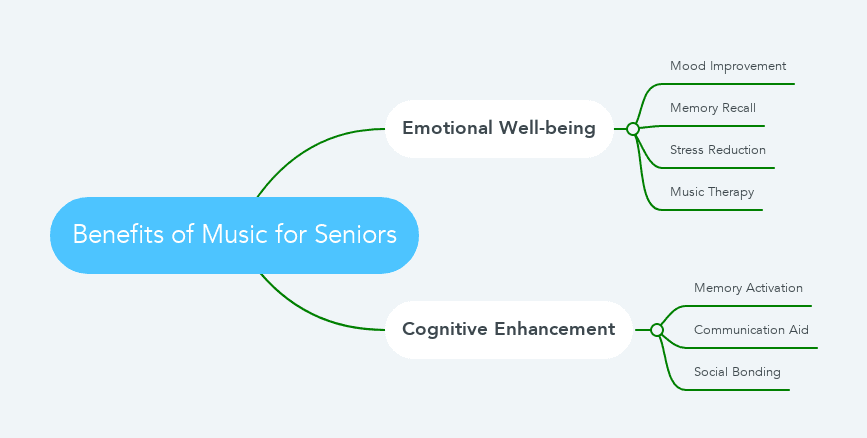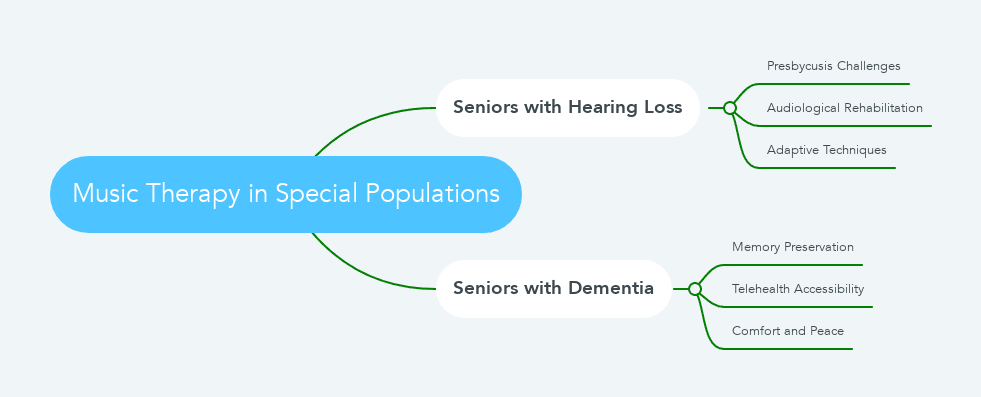- Understanding Therapeutic Music for Seniors
- Emotional and Cognitive Benefits of Music for Seniors
- Social and Intergenerational Benefits of Music for Seniors
- Music Therapy Techniques and Practices
- Personalization of Music Therapy for Seniors
- Cultural Considerations in Music Therapy for Seniors
- Physical Health Benefits of Music Therapy for Seniors
- Music Therapy in Special Populations: Seniors with Hearing Loss and Dementia
Understanding Therapeutic Music for Seniors
The Essence of Therapeutic Music
Therapeutic music is a special type of music made to help improve health and happiness. It's not just any music; it's chosen with the goal of making people feel better, both in body and mind. For seniors, this means music that can comfort, bring joy, and even help heal in a gentle way.
At its heart, therapeutic music helps by connecting with our feelings and memories through tunes and beats. It's a natural way to lift spirits, calm stress, and even help with sleep without needing words. The reason music therapy works is pretty interesting but straightforward. Music can make the brain release happy chemicals like dopamine, which makes us feel good. It also helps our brain waves match the rhythm of the music, leading to deeper relaxation.
Addressing Age-Related Challenges Through Music
Music therapy is especially good for seniors because it focuses on mental and emotional health. As we get older, issues like forgetting things, feeling lonely, and not moving as much can affect how we enjoy life. Music has this amazing ability to reach parts of our memory that seem untouched by time, helping seniors remember past moments and connect with who they are.
For example, hearing familiar songs can bring back memories from long ago, offering comfort and reducing feelings of being alone or sad. On the physical side, music with a good beat can encourage movement, whether it's just tapping a foot or dancing, which helps keep or even improve how well we move.
There are several kinds of therapeutic music activities that are good for seniors. Singing together can be great for making friends and remembering things. Drum circles or other activities with rhythm encourage moving and coordination in a fun way. Even listening to personalized playlists can have big effects on mood and thinking skills.
Emotional and Cognitive Benefits of Music for Seniors

Emotional Well-being Through Music
Music has a special way of making us feel better. For older people, it can really help improve their mood and make them feel good about themselves. When they listen to music, especially songs they know from the past, it can make them happier and more positive. The words in a song or a familiar melody can bring back memories and feelings, helping seniors reconnect with happy times.

Music therapy is also great for helping seniors feel less stressed and agitated. Whether it's listening to tunes, singing along, or playing an instrument, music offers a peaceful break from daily worries. This is especially helpful for those who might get upset easily due to memory problems. Adding music to their daily life can give them moments of calm and joy.
Cognitive Enhancement via Musical Engagement
Music doesn't just make seniors feel better; it also helps their brains stay sharp. Listening to songs they know can spark memories and improve thinking skills because music activates parts of the brain involved in remembering and thinking clearly. For those who find talking difficult due to memory issues, music can be a way to communicate and share feelings.
Sharing music with others is also good for the brain. When seniors enjoy music with family or friends, including younger people, it builds emotional bonds and keeps their minds active. These shared moments through music are precious; they not only help seniors mentally but also bring people closer together.
Social and Intergenerational Benefits of Music for Seniors
Social Benefits of Music for Seniors
Music can create strong bonds among people. Group singing and drum circles are great examples. These activities are more than just fun. They help fight off feelings of being alone or left out, which many seniors face. Picture the happiness that comes from singing together or playing drums in a group. It's about sharing good times, laughter, and sometimes quiet moments that say, "I understand."
Seniors have many ways to dive into music. Singing, playing instruments, or just moving to the music can bring a lot of joy. It also makes them feel part of a group. Joining local choirs or music groups gives seniors a chance to meet new friends and enjoy support from others who like music too.
Intergenerational Music Engagement
Mixing music activities with different generations is really exciting. A good example is the Intergenerational Choir Project. This project brings together people with dementia, their caregivers, and young students through singing. These choirs do more than sing; they create a place where everyone feels they matter. The best part is seeing how these different age groups understand and get along better because of music.
Another cool idea is making playlists that appeal to all ages. This simple activity starts conversations about favorite songs and memories linked to them. It's not just about sharing tunes; it's about sharing stories and connecting seniors with younger folks.
Music Therapy Techniques and Practices
Personalized Music Interventions
Music therapy starts by figuring out what kind of music the person enjoys. It's not just about playing any music; it's about choosing songs that mean something to them. Therapists use science to pick these songs, looking at how they can touch emotions or help with movement. For example, a song with a clear beat might help someone relax or improve their walking. The goal is to make the music fit the person's needs perfectly, aiming to make them feel better in a way that's just right for them.
Engaging with Music Therapy
There are many ways to be part of music therapy. People can play instruments, sing, or just listen. A fun part is improvisation, where people make up music on the spot. This lets them express themselves freely without worrying about getting it "right." Also, when therapists and clients make music together in real-time, it makes the experience more lively and personal. This helps therapists see how well their methods are working and change things up if needed.
Monitoring and Adapting Therapy
It's important for music therapy to change as needed. As people grow or their needs shift, the therapy should too. This could mean picking different songs or trying new activities that match their current goals like feeling less stressed or remembering better. Letting clients choose some of the music or activities keeps them interested and involved. Therapists keep track of how things are going and use this info to make each session better than the last. This cycle of checking in, making changes, and involving clients is key to making sure music therapy really makes a difference.
Personalization of Music Therapy for Seniors
Making Personal Playlists
Music therapy for seniors is all about what works best for each person. Therapists and seniors team up to pick songs that mean something special to each senior. These playlists are more than just a bunch of songs; they tell a story about the senior's life, where they come from, and what they love. It's like making a musical scrapbook that can take them back to happy times or connect them with their roots.
This process is a two-way street. Seniors get to pick the music that speaks to them, making them an active part of their own therapy. This involvement is key because it turns therapy into a personal adventure. Whether it's a tune that brings back good memories or music that helps calm the mind, these playlists are made to support each senior's emotional and thinking needs.
Setting Personal Goals
Music therapy is more than just listening to great tunes; it's about reaching goals that matter to each senior. Therapists work with seniors to figure out what they hope to achieve, whether it’s feeling less anxious, remembering things better, or feeling more connected with others. Setting these goals is a big part of the therapy process, making sure every session helps move toward these important targets.
The approach looks at the whole picture. It understands that being well means taking care of not just the body but also feelings, thoughts, and how people connect with each other. So, music therapy sessions are planned out to help with all these areas together. For example, singing can help make breathing better while also letting out emotions and helping seniors feel part of a group.
Cultural Considerations in Music Therapy for Seniors
Understanding Cultural Differences in Music Choices
When we use music therapy for older adults, it's important to remember that everyone comes from different cultural backgrounds. This means their music likes can vary a lot. To make sure the music we choose hits the right note, talking to family members or caregivers can help a lot. They can tell us what kind of music the person enjoys and what might have special meaning for them.
Paying attention to the language of the songs and the types of music traditions someone grew up with is also key. For many, hearing music in their first language or tunes from their childhood can bring back strong feelings and memories. So, when picking out music for therapy, thinking about these things can make the sessions more personal and effective.
Bringing In Cultural Traditions and Celebrations
Music therapy can also celebrate where someone comes from. Using folk or traditional music in sessions lets older adults reconnect with their roots. This not only makes therapy more interesting but also shows respect for their cultural background.
Holidays and special times of year give us another chance to make music choices that match someone's cultural traditions. Choosing songs that go with these times can bring back happy memories and make therapy more special. It’s a good way to keep things exciting and engaging too.
Talking with older adults about their family's musical traditions is another good idea. These chats can help us find out about songs that are especially meaningful to them. Plus, it helps build a stronger bond between the therapist and the person, making therapy even better.
Physical Health Benefits of Music Therapy for Seniors
Enhancing Movement and Coordination
Music therapy is a great way to get seniors moving, which is important for a healthy heart. Upbeat music makes people want to move, dance, or do exercises. It's not just about moving; it's about moving in a way that helps with balance and coordination. Music therapy includes exercises that help seniors move more smoothly and stay steady on their feet. This is key for preventing falls, which can be a big worry for older adults. In short, music acts as a fun push to help seniors move better and feel more confident.
Strengthening Muscles and Improving Rehabilitation
Music therapy does more than just get you moving. It also focuses on making muscles stronger and helping with rehab after injuries. When seniors play musical instruments, they're not just making sounds; they're improving their muscle control and strength. This can lead to stronger muscles and even healthier bones over time. Also, using music with a steady beat in rehab programs makes exercises less boring and might help seniors stick with their rehab routines. In simple terms, music therapy helps with physical recovery while making the process enjoyable for seniors.
Music Therapy in Special Populations: Seniors with Hearing Loss and Dementia

Music Therapy for Seniors with Hearing Loss
As people get older, many start to lose their hearing, a condition known as presbycusis. This can make enjoying music difficult, which is sad because music can bring a lot of happiness. Thankfully, music therapy offers a way to help. It's not just about listening to music; it's about using music to improve hearing and feel connected.
For those wearing hearing aids or cochlear implants, music might not sound like it used to. But that doesn't mean they can't enjoy music anymore. Music therapy can help adjust these devices so that music sounds better. This is part of what experts call audiological rehabilitation - helping people with hearing loss enjoy sounds again.
To make music therapy work for seniors with hearing loss, therapists might use visual signs or pick instruments that make vibrations you can feel. This way, enjoying music isn't just about hearing; it's also about feeling the beat and the rhythm.
Music Therapy for Seniors with Dementia
When it comes to dementia, including Alzheimer’s disease, music therapy is really useful too. It works because the parts of the brain that remember music are often still strong even when other memories fade. Singing, listening to old favorites, or moving to the beat can bring back memories and moments of happiness.
Nowadays, thanks to technology like telehealth, music therapy can reach seniors with dementia who can't leave their homes. This means more people can enjoy the benefits of music therapy without having to go anywhere.
Music therapy does more than just jog memories; it also offers comfort, especially when times are tough. For seniors at the end of their life journey, music can be soothing and bring peace, helping them and their families through challenging times.








